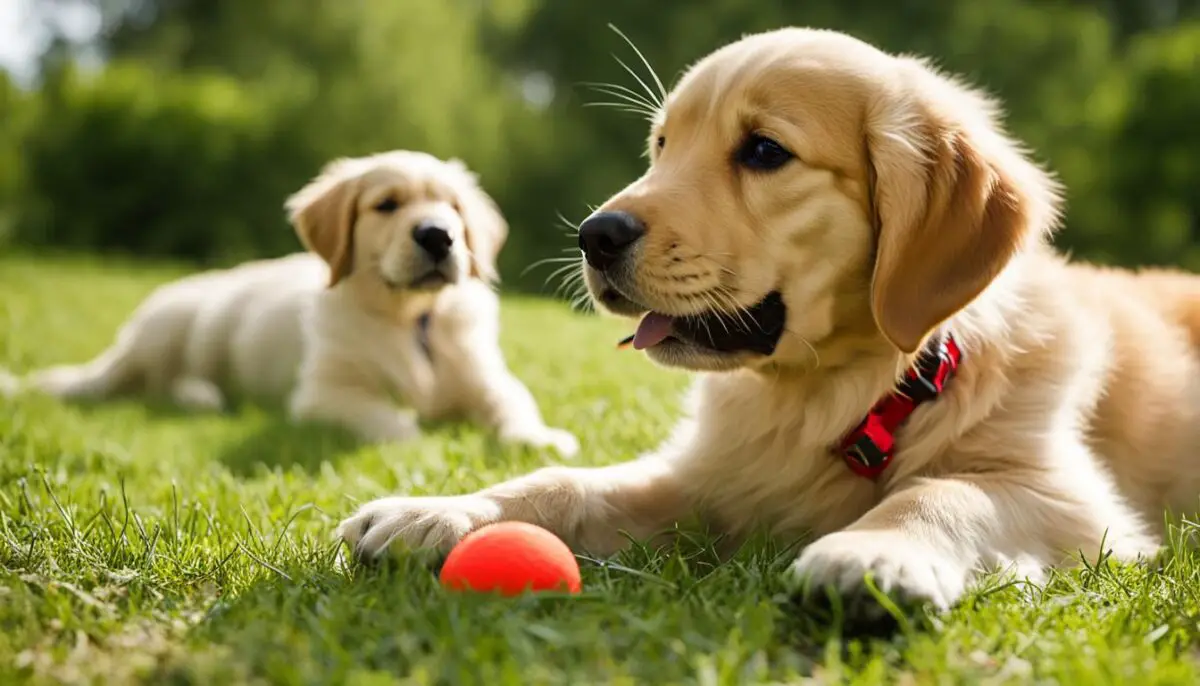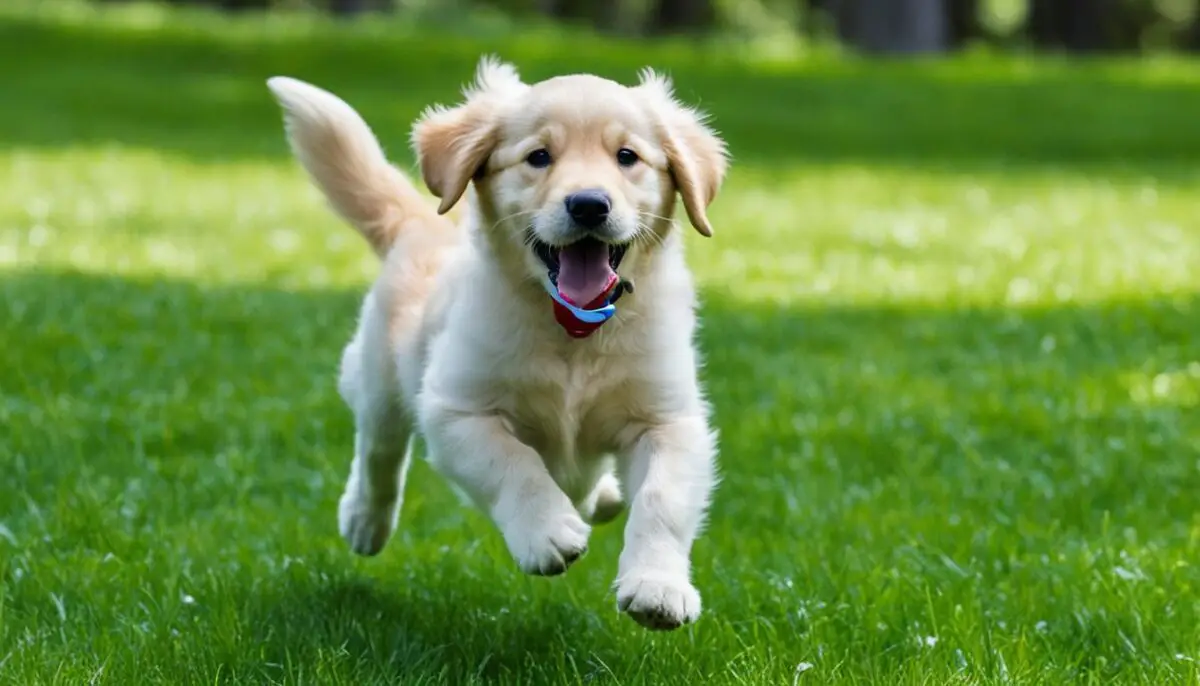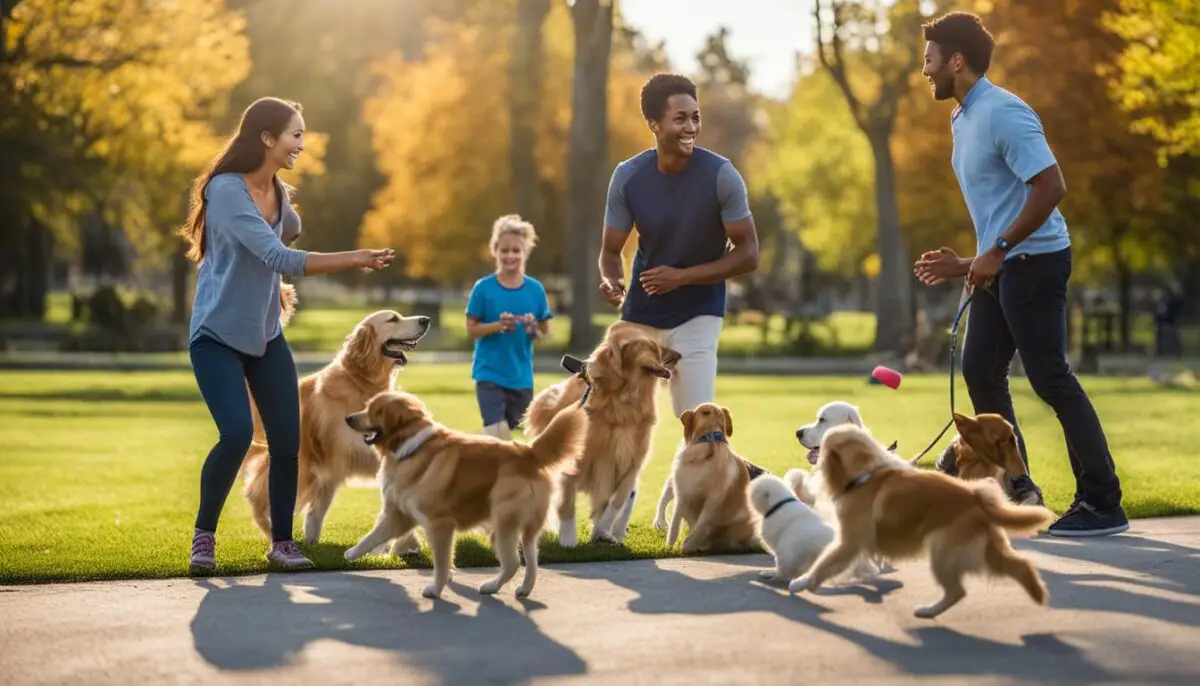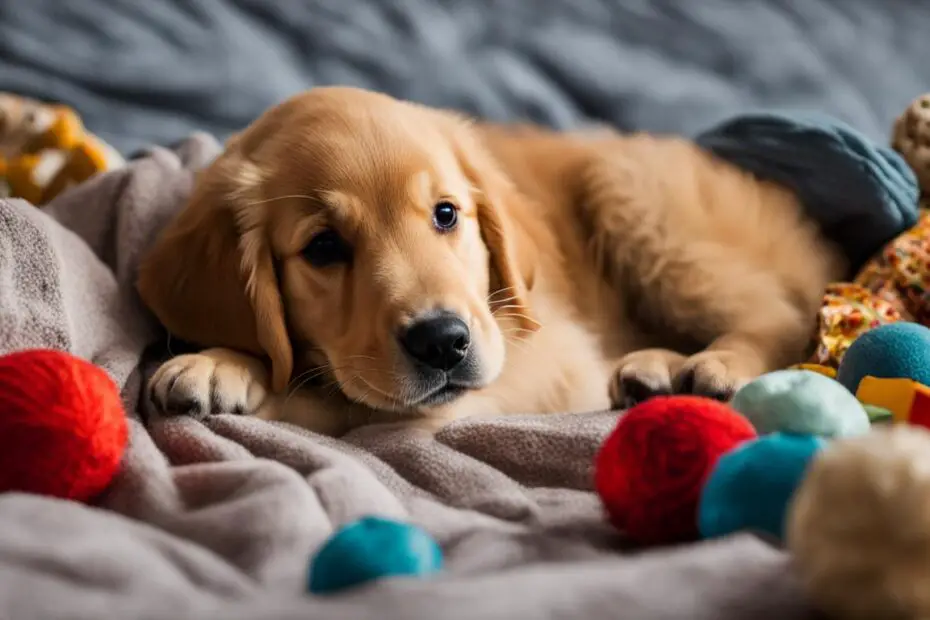Welcome to the wonderful world of caring for a Golden Retriever puppy! These adorable and affectionate dogs are known for their loyalty and intelligence. Whether you are a first-time dog owner or have had Golden Retrievers before, it’s important to understand the specific care needs of this breed. In this article, we will provide you with valuable tips and information on how to ensure the health and happiness of your furry friend.
Golden Retrievers are family-oriented dogs and thrive in an active and loving environment. They require regular exercise, proper nutrition, and early training to grow into well-behaved and happy adult dogs. Taking the time to provide the necessary care and attention will result in a lifelong bond with your Golden Retriever puppy.
Key Takeaways:
- Golden Retrievers require regular exercise to keep them physically and mentally stimulated.
- A balanced diet, appropriate for their age and size, is essential for their growth and development.
- Training and socialization from an early age are crucial to raise a well-behaved Golden Retriever.
- Grooming, including regular brushing and bathing, is necessary to maintain their coat’s health and cleanliness.
- Regular vet check-ups and staying informed about common health issues can help prevent or manage potential problems.
Now, let’s dive deeper into these topics and learn more about the proper care and nurturing of your Golden Retriever puppy.
Training Your Golden Retriever Puppy
Training a Golden Retriever puppy is vital to ensure they develop into well-behaved dogs. By establishing a consistent daily training schedule and using positive reinforcement techniques, you can help your puppy learn commands and obedience effectively.
Early socialization is crucial for Golden Retriever puppies to feel comfortable around people and other dogs. Introduce them to different environments, experiences, and interactions in a positive, controlled manner. This will help shape their behavior and confidence in various situations.
When training your Golden Retriever puppy:
- Use rewards such as treats, praise, and play to reinforce desired behaviors.
- Be patient and consistent to establish clear boundaries and expectations.
- Focus on positive reinforcement rather than punishment, as this will build trust and a strong bond with your puppy.
Remember, Golden Retrievers are intelligent and eager to please, making them highly trainable. However, they may also have a tendency to be easily distracted, so keep training sessions short and engaging to maintain their focus.
“The key to successful training is consistency, patience, and positive reinforcement.” – Professional Dog Trainer
Training Tips for Golden Retriever Puppy Behavior:
| Training Tip | Description |
|---|---|
| Start Early | Begin training and socialization as soon as you bring your Golden Retriever puppy home to establish good habits from the start. |
| Offer Rewards | Use treats, praise, and playtime to reward positive behavior, encouraging your puppy to continue learning and obeying commands. |
| Be Patient | Golden Retrievers are eager to please, but they may take time to grasp commands fully. Stay patient and consistent in your training approach. |
| Practice Consistently | Make training a part of your daily routine to reinforce commands and reinforce behavior consistently. |
| Provide Mental Stimulation | Incorporate puzzle toys and interactive games into your puppy’s training routine to keep their mind engaged and prevent boredom. |

Training your Golden Retriever puppy requires dedication and commitment, but the rewards of a well-behaved and happy companion are well worth the effort. With positive reinforcement, early socialization, and consistent training, you can help your Golden Retriever puppy develop into a well-adjusted and obedient adult dog.
Feeding Your Golden Retriever Puppy
Golden Retriever puppies have specific nutritional needs for proper growth and development. To ensure they receive the right nutrients, it is recommended to feed them a high-quality puppy food that is appropriate for their age and size. This will provide them with the essential vitamins, minerals, and proteins they need to thrive.
Consult with your veterinarian for specific recommendations on the type of puppy food that suits your Golden Retriever’s needs. They will take into account factors such as their age, weight, and any special dietary requirements. Veterinarians can suggest reputable brands and guide you on portion sizes and feeding intervals.
As your Golden Retriever puppy grows, their nutritional needs will change. You may need to adjust their portion sizes accordingly to ensure they receive the right amount of food. Keep in mind that overfeeding can lead to weight gain, which can put strain on their joints and overall health.
Along with a balanced diet, make sure to provide fresh water at all times. Hydration is crucial for your puppy’s well-being. Set up a designated water bowl that is easily accessible to them.
Remember, feeding your Golden Retriever puppy is an essential part of their care routine. It’s crucial to provide them with appropriate nutrition to support their growth and development.
Tips for Feeding Your Golden Retriever Puppy:
- Choose a high-quality puppy food that is suitable for their age and size.
- Consult with your veterinarian for specific recommendations.
- Follow the feeding guidelines provided by the puppy food manufacturer.
- Monitor their weight and adjust portion sizes accordingly.
- Provide fresh water at all times.
- Avoid feeding your puppy human food, as it may be harmful to their health.

| Age | Portion Size |
|---|---|
| 6-8 weeks | 1/4 – 1/2 cup, 3-4 times a day |
| 8-12 weeks | 1/2 – 1 cup, 3 times a day |
| 3-6 months | 1 – 1 1/2 cups, 3 times a day |
| 6-12 months | 1 1/2 – 2 cups, 2 times a day |
Exercising Your Golden Retriever Puppy
Golden Retrievers are known for their high energy levels, so regular exercise is essential for keeping them happy and healthy. Here are some exercise tips to help you keep your Golden Retriever puppy active:
- Take daily walks: A brisk walk is a great way to exercise your Golden Retriever puppy. Aim for at least 30 minutes of walking per day to help burn off their excess energy. It also provides an opportunity for them to explore their surroundings and engage in mental stimulation.
- Engage in playtime: Golden Retrievers love to play, so make sure to set aside time each day for interactive play sessions. Use toys such as balls or Frisbees to engage them in games of fetch. This not only helps burn off their energy but also strengthens the bond between you and your puppy.
- Try interactive activities: Golden Retrievers are intelligent dogs, so incorporating interactive activities into their exercise routine can be highly beneficial. Consider puzzle toys or treat-dispensing toys that require them to think and problem-solve while exercising.
- Explore outdoor adventures: Golden Retrievers are natural explorers and enjoy outdoor activities. Take them on hikes, go for a swim in a dog-friendly lake or beach, or explore nature trails together. These activities not only provide physical exercise but also allow your puppy to experience new environments and stimuli.
Remember, while exercise is important for a Golden Retriever puppy’s physical and mental well-being, it’s crucial not to over-exercise them, especially when they are young and still growing. Always consult with your veterinarian to determine the appropriate exercise routine for your individual puppy.

“Regular exercise is key to keeping your Golden Retriever puppy happy and healthy. By providing them with various activities and opportunities to burn off their energy, you’ll have a well-rounded and content companion.”
Grooming Your Golden Retriever Puppy
Grooming is an essential part of caring for your Golden Retriever puppy. Their dense double coat requires regular maintenance to keep it clean, healthy, and free from mats. Follow these golden retriever puppy care tips to ensure your furry friend stays looking and feeling their best.
Brushing for a Beautiful Coat
Regular brushing is crucial in grooming a golden retriever puppy. It not only helps remove loose hair and prevent excessive shedding but also promotes healthy skin and coat. Aim to brush your puppy’s coat at least once a week using a slicker brush or a grooming tool suitable for their fur type. Start at the head and work your way down, paying special attention to areas prone to matting, such as behind the ears, under the belly, and around the tail. Brushing your puppy’s coat not only keeps it tangle-free but also strengthens the bond between you and your furry friend.
Bathing for Cleanliness
Bathing your golden retriever puppy should be done as needed to keep their coat clean and their skin healthy. Use a gentle dog shampoo that is suitable for their sensitive skin and follow the manufacturer’s instructions. It’s important to rinse thoroughly and avoid leaving any soap residue, as it can cause skin irritation. Remember that excessive bathing can strip their coat of natural oils, leading to dryness. So, unless your puppy gets dirty or smelly, it’s best to limit bathing to once every 4-6 weeks.
Nail Trimming, Ear Cleaning, and Teeth Brushing
Grooming goes beyond brushing and bathing. Regular nail trimming, ear cleaning, and teeth brushing are important aspects of golden retriever puppy care. Long nails can cause discomfort and affect your puppy’s gait, so be sure to regularly trim their nails using a dog nail trimmer or grinder. Additionally, ear cleaning should be done weekly using a dog ear cleaner and cotton ball. Finally, introduce your puppy to teeth brushing early on to maintain good oral hygiene. Use a dog toothbrush and toothpaste specifically formulated for dogs to prevent dental issues.

| Grooming Task | Frequency |
|---|---|
| Brushing | At least once a week |
| Bathing | As needed, typically every 4-6 weeks |
| Nail Trimming | Every 2-4 weeks |
| Ear Cleaning | Weekly |
| Teeth Brushing | Daily |
Regular grooming sessions not only keep your golden retriever puppy looking their best but also provide an opportunity to check for any skin issues, ticks, or other abnormalities. Make grooming a positive and enjoyable experience for your puppy by rewarding them with treats and praise. If you’re unsure about any aspect of grooming, consult with a professional groomer or your veterinarian for guidance.
Socializing Your Golden Retriever Puppy
Socialization is an essential part of raising a well-behaved and confident Golden Retriever puppy. By introducing your puppy to various environments, people, and animals in a positive and controlled manner, you can help them develop good behavior and social skills. Early socialization is key to ensuring your Golden Retriever grows up to be a well-adjusted and friendly adult dog.
Here are some tips to effectively socialize your Golden Retriever puppy:
- Start Early: Begin socializing your puppy as early as possible, ideally between 3 and 14 weeks of age. During this critical period, your puppy is more receptive and adaptable to new experiences.
- Positive Experiences: Introduce your puppy to new situations, people, and animals in a positive and controlled way. Use treats, praise, and play to create positive associations. This will help your puppy feel comfortable and confident in different environments.
- Puppy Classes: Enroll your Golden Retriever puppy in puppy classes or obedience training classes. These structured settings provide an opportunity for your puppy to interact with other dogs and learn proper social skills and behavior.
- Playdates: Arrange playdates with other friendly and vaccinated dogs. Supervise the interactions between the puppies to ensure they play nicely and learn appropriate social behaviors.
- Expose to Different Stimuli: Expose your puppy to various sights, sounds, smells, and textures. Take them on car rides, walks in the park, and visits to different places. This exposure will help them become more adaptable and less fearful of new experiences.
Remember to always prioritize your puppy’s safety and well-being during socialization. Monitor their interactions closely and provide a secure and positive environment. With consistent socialization efforts, your Golden Retriever puppy will grow up to be a well-socialized and friendly companion.

Avoiding Common Mistakes in Socialization
Socializing your Golden Retriever puppy can be a rewarding process, but it’s important to avoid some common mistakes:
- Avoid overwhelming your puppy with too many new experiences all at once. Gradually expose them to new environments and stimuli to prevent fear or anxiety.
- Don’t force interactions. Allow your puppy to approach people or other dogs at their own pace. Pushing them into uncomfortable situations can create negative associations.
- Avoid exposing your puppy to unvaccinated or unfamiliar dogs until they have completed their vaccination series. This helps protect them from potential illnesses and infections.
- Don’t neglect socialization as your puppy grows older. Continued exposure to new experiences and environments throughout their life will help maintain their social skills.
Following these socialization tips and avoiding common mistakes will help ensure that your Golden Retriever puppy grows up to be a well-rounded and confident dog.
Health Issues in Golden Retriever Puppies
Golden Retrievers are generally a healthy breed, but it’s important to be aware of potential health issues that may affect Golden Retriever puppies. By understanding these conditions and taking proactive measures, you can ensure the well-being of your furry companion.
Common Health Problems
Some common health problems in Golden Retriever puppies include:
- Hip and Elbow Dysplasia
- Heart Disease
- Certain Types of Cancer
Regular vet check-ups, proper nutrition, exercise, and early detection are key to managing and preventing these health issues.
Veterinary Care
Regular visits to a veterinarian are crucial for monitoring the health of your Golden Retriever puppy. A veterinarian can provide vaccinations, perform routine examinations, and detect any potential health problems early on. Additionally, they can offer guidance on nutrition, exercise, and preventative care.
Nutrition and Exercise
Proper nutrition is essential for a Golden Retriever puppy’s overall health. Feed them a high-quality, age-appropriate puppy food that meets their nutritional needs. Avoid overfeeding to prevent weight gain, which can contribute to certain health issues.
Regular exercise is important for a Golden Retriever puppy’s physical and mental well-being. Engage them in daily activities such as walks, playtime, and interactive games. Be cautious not to over-exercise a young puppy, as their joints are still developing.
Early Detection and Prevention
Keep an eye out for any changes or symptoms that may indicate a health issue in your Golden Retriever puppy. These may include limping, difficulty breathing, abnormal growths, or changes in appetite or behavior. If you notice any concerning signs, consult your veterinarian immediately.
Working with a reputable breeder can play a significant role in preventing certain hereditary health issues. Reputable breeders conduct health tests, ensure proper breeding practices, and provide documentation of the puppy’s lineage.
| Common Health Problems | Prevention and Management |
|---|---|
| Hip and Elbow Dysplasia | Regular exercise, maintaining a healthy weight, and genetic testing |
| Heart Disease | Regular vet check-ups, a balanced diet, and avoiding excessive stress |
| Certain Types of Cancer | Early detection through regular vet check-ups and awareness of common symptoms |
By being proactive in your Golden Retriever puppy’s health care, you can help them live a happy and fulfilling life free from unnecessary health complications.
Conclusion
Caring for a Golden Retriever puppy is a rewarding and fulfilling experience. By providing love, attention, and proper care, you can ensure the well-being of your furry friend. Throughout this article, we have discussed important aspects of caring for a Golden Retriever puppy, including training, feeding, exercising, grooming, socializing, and understanding their health needs.
Remember to follow a consistent training schedule using positive reinforcement techniques to raise a well-behaved and obedient puppy. Provide them with a balanced diet tailored to their age and size, consulting with your veterinarian for specific recommendations. Give them regular exercise and engaging activities to keep them happy and healthy.
Take the time to groom your Golden Retriever puppy regularly, focusing on brushing their coat to prevent mats and bathing them when necessary. Socialize them from an early age, introducing them to various environments, people, and animals to develop their social skills. And always stay vigilant about their health by scheduling regular vet check-ups and staying informed about any breed-specific health issues.
Enjoy the journey of raising and bonding with your Golden Retriever puppy. They will be a loyal and loving companion for many years. By following these tips and guidelines, you can provide the best care possible for your beloved Golden Retriever puppy.
FAQ
How often should I groom my Golden Retriever puppy?
It is recommended to brush your Golden Retriever puppy’s coat at least once a week to remove loose hair and prevent mats. Bathing should be done as needed to keep their coat clean. Regular nail trimming, ear cleaning, and teeth brushing are also important aspects of grooming.
How should I train my Golden Retriever puppy?
Training a Golden Retriever puppy involves establishing a daily training schedule and using positive reinforcement techniques. Consistency and patience are key. Socialization from an early age is also important for them to feel comfortable around people and other dogs.
What should I feed my Golden Retriever puppy?
It is recommended to feed your Golden Retriever puppy a high-quality puppy food that is appropriate for their age and size. Consult with your veterinarian for specific recommendations on portion sizes and feeding intervals. Provide fresh water at all times and avoid overfeeding to prevent weight gain.
How much exercise does my Golden Retriever puppy need?
Golden Retrievers are an energetic breed, but you should be mindful not to over-exercise a young puppy. Daily walks, playtime, and interactive activities are important for burning off their energy. Engaging in activities like hiking, swimming, and retrieving games can help keep them happy and healthy.
Why is socialization important for my Golden Retriever puppy?
Socialization is crucial for a Golden Retriever puppy to develop good behavior and confidence. Introduce your puppy to various environments, people, and animals in a positive and controlled manner. Puppy classes and playdates can help them learn proper social skills and interaction.
What are some common health issues in Golden Retriever puppies?
Golden Retrievers are generally a healthy breed, but they are prone to certain health issues such as hip and elbow dysplasia, heart disease, and certain types of cancer. Regular vet check-ups, proper nutrition, exercise, and early detection of any health issues can help prevent or manage these conditions.
